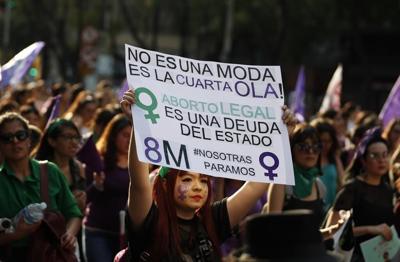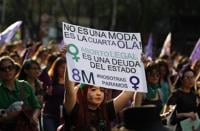MEXICO CITY (AP) — The decision by Mexico's Supreme Court ending federal criminal penalties for abortion was a boost to activists who waged decades-long campaigns for safe abortion access nationwide. The mostly Catholic country still has significant barriers to overcome before Mexican women gain universal access.
Twenty of ’s 32 states have laws classifying abortion as a crime that allow exceptions only in cases of rape. Some also include exceptions if the mother’s life is in danger, or if there are severe fetal anomalies.
Mexican Supreme Court decisions are not automatically the law of the entire nation: They often have reach that's somewhat limited.
Wednesday's decision applied to federal anti-abortion penalties, meaning that the instant impact will be felt in the massive federal health system. While millions of women receive services through that system, many get them through other providers.
A 2021 Supreme Court decision that overturned a law criminalizing abortion in one northern state set activists working to get legislatures in other states to change their laws. That effort does not end with Wednesday's decision.
Mexico's Catholic leadership body, the Mexican Episcopal Conference, condemned the new court decision, saying that it “normalizes the throw-away culture and relieves authorities and society of responsibility.”
Here is what the ruling means and what challenges remain:
WHAT DOES MEXICAN LAW SAY ABOUT ABORTION?
Mexico’s federal penal code says that women who terminate their pregnancies can face prison time, fines or other sanctions such as community service or psychological treatment.
Medical professionals who provide the abortion, or those who help, can also face prison sentences and the suspension of their professional certification.
As a federation, Mexico’s 32 states have their own criminal laws, which have to be reformed by state legislatures.
WHAT DID THE SUPREME COURT DECIDE?
Mexico’s top court ruled Wednesday that federal laws criminalizing abortion are unconstitutional. The court ordered Mexico’s Congress to reform the federal penal code before its session ends in December.
WHAT IS THE NEW RULING’S REACH?
Hospitals and clinics across the country that make up the federal public health system will have to provide abortion services once the federal law is reformed, said Isabel Fulda, deputy director of the Information Group for Chosen Reproduction, known by its Spanish initials, GIRE.
Fulde said that, in the 20 states that still criminalize abortion, the latest court ruling does not cover local hospitals that are not part of the federal public system.
WHICH STATES HAVE ALREADY DECRIMINALIZED ABORTION?
Mexico City was the first Mexican jurisdiction to decriminalize abortion 16 years ago. Since then, 11 more states have followed, most recently the central state of Aguascalientes last week. The others include Oaxaca, Baja California, Baja California Sur, Guerrero, Hidalgo, Veracruz, Colima, Guerrero Sinaloa and Quintana Roo.
In the remaining states, there are barriers that can block women’s access but, based on the Supreme Court’s decisions declaring penalties unconstitutional, women cannot be arrested or tried.
WHAT CHALLENGES REMAIN?
Mexico’s Congress is expected to make the required changes to federal law. Fulda said that the most challenging part of the process will be implementing full access to abortion services in all federal public hospitals and clinics.
She expects resistance by officials in some states, as well as financial limits for supplies and training.
Meanwhile, groups like hers will continue challenging the criminal penalties still on the books in those remaining 20 states.








































